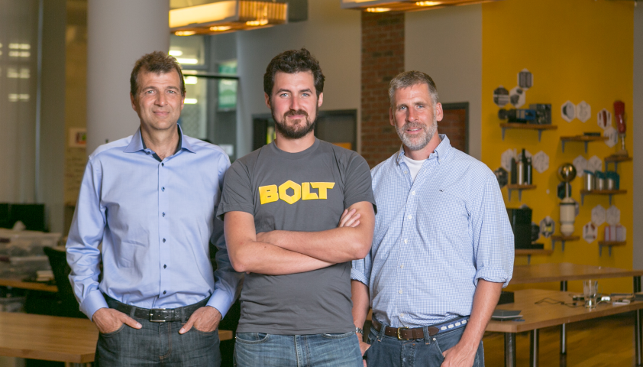
The BOLT leadership team, from left to right: Axel Bichara, Ben Einstein and Scott Miller
Ben Einstein has first-hand experience of what it takes to bring a hardware project to market. As founder of Brainstorm Design, a product design and development consultancy in Massachusetts, his clients ranged from small cash-strapped startups to large multi-million dollar companies.
It was the struggling start-ups, often consisting of just one or two people, that interested him most. So in 2013, he cofounded BOLT, a seed-stage fund that invests capital, personnel, equipment and expertise in hardware start-ups.
“Just like most investors we have a fairly high bar for the companies that we invest in,” explains Einstein. “We look at about 100 companies for every one we invest in. So there is a pretty significant amount of companies that we look at and then we pick the best that we believe can build big multi-million dollar businesses, which takes a long time. In many cases, 10 years or more.”
Each start-up will receive between $100k to $500k, but these funds are just part of the story because it takes more than money to build successful products and businesses.
BOLT’s full-time design and engineering team is on hand to help at each step of building the physical product. It also has two fully equipped workshops in Boston and San Francisco that are open to clients 24/7.
“We have extensive equipment, from a cutting-edge digital fabrication lab through to an electronics workshop, to help our companies go through the process of building early prototypes. But in addition to the physical development of products, we also help them think through manufacturing, margin structures, marketing distribution and so on,” says Einstein.
BOLT has helped dozens of young companies launch onto the international stage, including pet care brand Petnet. Its launch product is a smart automatic feeding device for dogs and cats.
“This device has been for sale for a little under a year and will launch internationally in the next couple of months. At the moment, it’s not a success in the business sense of the word as it’s still such early days, but hopefully that will come soon,” says Einstein.
With many hardware start-up founders thinking that an incubator or accelerator programme like BOLT might provide a good route to market, Einstein has three top tips to think about before they embark along this route.
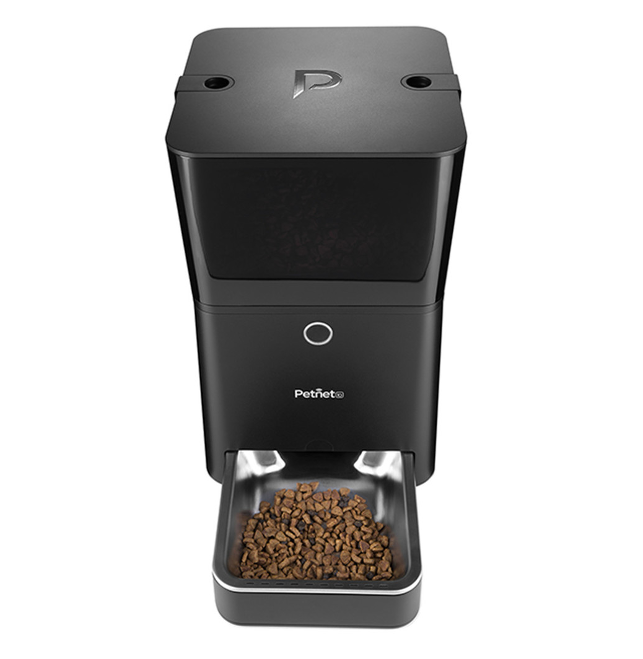
One of Bolt’s recent successes, Petnet. Its launch product is a smart automatic feeding device for dogs and cats
#1 What do you want to do when you grow up?
The most important thing is for companies to really think what they want to be when they grow up. Do you want to grow and become a multi-million dollar company – or is making a couple of million dollars a year a perfectly fine outcome?
The latter may be fine for you, but it’s not a good outcome for investors. So, any young hardware company that wants to take money from an investor, especially accelerators, should think really carefully about what they want to be when they grow up.
#2 What do you want to get out of an accelerator?
It’s really important to think about what you expect to get out of an accelerator programme.
Most accelerators are focused on software; as a result, they don’t optimise for helping hardware companies to grow.
So it’s crucial to identify what makes sense for you as the founder of a young hardware company, before deciding whether an accelerator programme is the right option for your business.
#3 Your go-to market plan is fundamental
You need a really well thought out plan on the go-to-market side, which is an aspect that a lot of early-stage companies neglect.
BOLT looks at about 1,000 companies per year and more than 80% of them haven’t thought carefully about distribution and how to sell their product. Typically, the best companies are actually not the best builders of product, they are the best distributors of product.
So founders of early-stage companies, especially consumer-focused companies, need to think very carefully about distribution, retail margins, marketing and so on, before they sign up to one of these programmes.
Three incubators from around the world
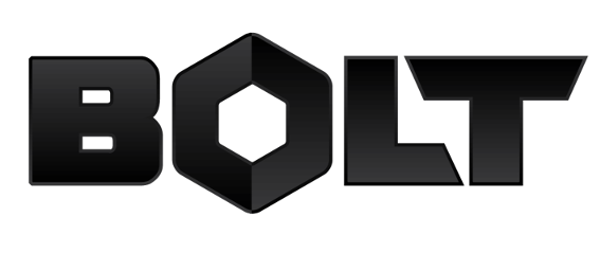
Bolt
BOLT is a US-based seed-stage fund that invests $100k to $500k in promising hardware start-ups. This funding is acquired from an investor base including Autodesk, Logitech and Grishin.
As well as this capital, BOLT provides start-ups with staff, shop equipment and extensive expertise to help build a robust business from the ground up. Its full-time engineering and design staff offer support from the earliest stages of the design and development process through to the building of a market-ready product.
Headquartered in Boston, BOLT has two fully equipped workshop facilities in Boston and San Francisco, which clients have access to 24/7. These facilities have over $20 million of equipment that includes a digital fabrication lab, woodworking and metalworking shops, 3D printing lab, laser cutting and high-end printing capabilities and an electronics workshop.
In addition to its engineering and design team, BOLT is supported by an extensive network of suppliers, machine shops and contract manufacturers around the world to see the client’s product through production and distribution.
Since 2013, it has helped an impressive portfolio of promising start-up companies including pet products company Petnet, wearable technology company Pavlok and diabetes management platform One Drop.
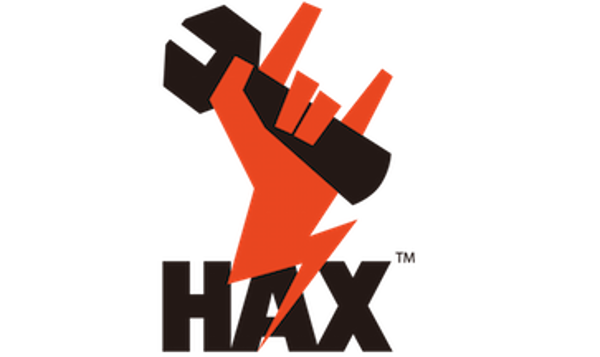
HAX
HAX prides itself on being the world’s first and most prolific hardware accelerator.
Its 12 full-time staff based at offices in Shenzhen and San Francisco offer endto-end acceleration to global hardware start-ups. HAX will help build and scale products through its extensive global network, hands-on ‘lean hardware’ approach and the ecosystem resources of Shenzhen and Silicon Valley.
Start-ups can choose to receive $25k or $100k, provided by the venture capitalist firm SOSV, a $250 million fund that provides follow-on funding of at least $200k when raising a seed round.
HAX offers over 100 days of hands-on support with a structured acceleration curriculum, including lectures, workshops, 1:1 coaching sessions and so on. Free coworking and workshop access is provided during and after each program.
Support is also provided through its 50-plus global mentor network, as well as the 300 alumni who have been through the acceleration program themselves.
The 100-plus start-ups that HAX has helped to date include world-first products launched on Kickstarter, including Revols instant-fit earphones, and CHIP, the world’s first $9 computer.
Beyond consumer devices, HAX has also accelerated many robotics and health tech companies, such as delivery robot Dispatch and inventory robot Simbe.
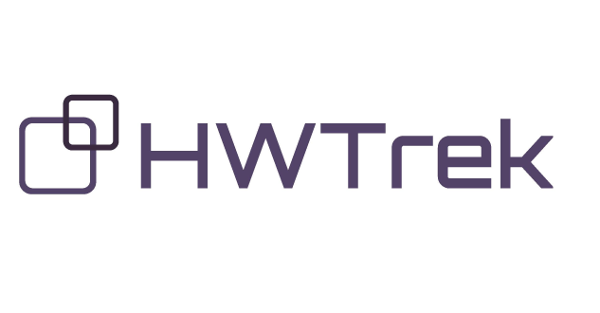
HWTrek
HWTrek (Hardware Trek) is not a hardware accelerator programme or an incubator as such, but rather an ecosystem where hardware creators and industry experts meet to create smart hardware.
Based in Taiwan and Shenzhen, HWTrek simplifies the hardware creation process by providing online planning and team collaboration tools and direct access to quality manufacturers and industry experts.
This global open innovation platform enables hardware start-ups (‘Creators’) looking for help with their hardware projects to connect with companies (‘Experts’) that have hardware solutions, components, insight and services to offer.
On the HWTrek platform, Creators and Experts collaborate in ways designed to help Creators save time, money and stress during the design and development process. HWTrek’s project managers are also on hand to help Creators find suppliers, manufacturers and testing facilities.
Creators also have access to the HWTrek Project Development Hub – a navigation tool to oversee the progress of their projects.
Developed working prototypes can then be pre-sold through HWTrek’s crowdfunding feature to raise cash for manufacturing. To date, HWTrek has 5,476 registered Creators, 996 registered Experts and 1,511 projects launched.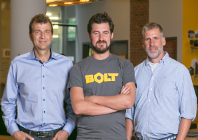
We talk to Ben Einstein of BOLT about bringing hardware projects to market
Default






